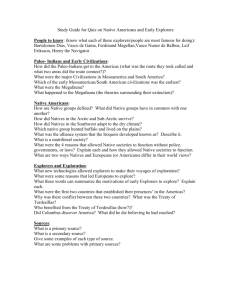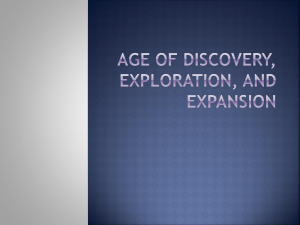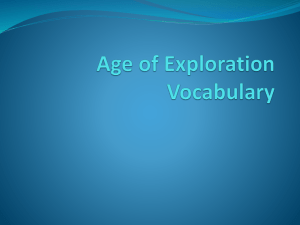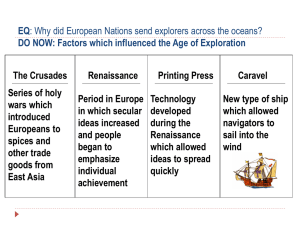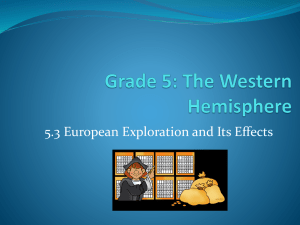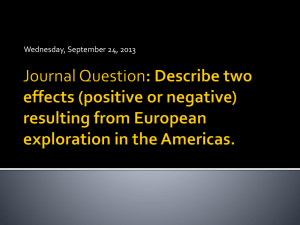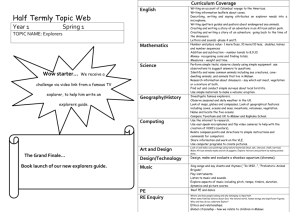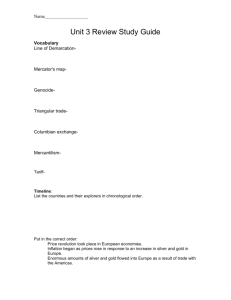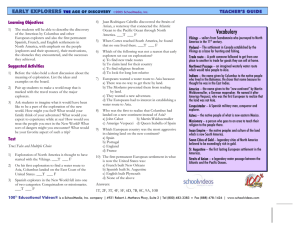Age of Discovery, Exploration, and Expansion September 14, 2015
advertisement
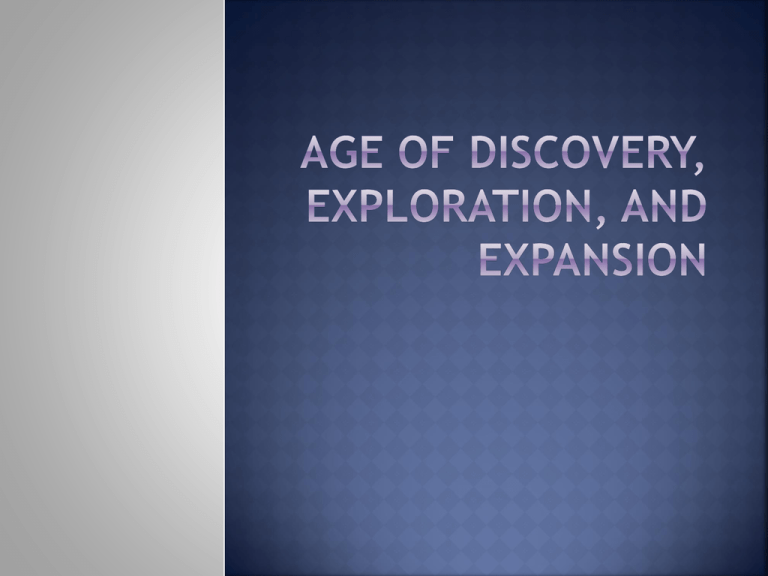
After coming into class quietly and taking your seat, turn to the Hey History! Section in your binder. Topic: After the Italian Renaissance Reflect upon and answer the following questions 1) 2) How might the Italian Renaissance and the Protestant Reformation changed the way people thought about the natural world? What changes in technology and society might have encouraged the quest for new knowledge? For each term, rate how familiar/unfamiliar you are with each one (check for very familiar, question mark for somewhat familiar, and a minus for never heard of it) For the words you are familiar with, work on filling in the example and definition portion of the activity Follow the directions at the top of the page to complete the assignment for the BEFORE portion. Can you relate any of the statements to word or phrase from the Vocabulary SelfAwareness Chart? Work with your group to come up with a possible definition of what you believe the Scientific Revolution was… Possible things that may have happened during the revolution (specific and nonspecific ideas) The spirit of the Renaissance encouraged curiosity, investigation, discovery, and the practical application of knowledge in everyday life People were more open to using new approaches to answer questions about the natural world During this era known as the Scientific Revolution, people began to use new approaches to answer these questions about the natural world! Copernicus Galileo Boyle Kepler Vesalius 1) Personality, 2) Native Origin, 3) Area of Contribution, 4) Scientific Discoveries, 5) Published Works. Give an explanation for what you believe to be the greatest accomplishment/contribution to the world during the Scientific Revolution? Read Chapter 7, Sections 1-2 from the Textbook After coming into class quietly and taking your seat, turn to the Hey History! Section in your binder. Topic: Divide Going on a trip… your HEY HISTORY! box into three sections C1: Imagine you are going to go on a trip across country tomorrow; make a list of all the things you will need to get to your final destination… C2: Now, it is 1990, what does your list look like now?... C3: Now, it is 1900, what does your list look like now?... Graphic Organizer… Imagine you and your group members have just formed a joint-stock company, a business organization who raises large amounts of money to finance exploration As a new company, you have decided you would like to have me, Mr. Glueck, invest in your company Your group will write a sales pitch to convince me why I should invest in your company! Each group member should play a role in the pitch You should include what you know about new advancements, the Commercial Revolution, and the trend of exploration to convince me. European Explorers Chart Use pages 204 and 205 from your textbook to outline the routes of the European explorers from your chart… (Except Prince Henry) What were some of the reasons why the explorers chose to embark on their quests, and what do you believe was the most important reason for exploration? Use pages 204 and 205 from your textbook to outline the routes of the European explorers from your chart… (Except Prince Henry) Read Chapter 7, secs. 3-4 After coming into class and quietly taking your seat, take out your World History! Materials Use your smart devices to fill in your charts for the remaining explorers we will be talking about… Use the map on Page 204-205 of your textbook to draw conclusions about the major groups of European Explorers For each one (5 total), are there any trends you can gather from the routes? Any conclusions you might be able to draw? Portuguese Interest in South America Interest in finding route to India Spanish Interest in North America (colonization) Interest in S. America (going around S. America) Navigating around the globe French Interest in colonizing North America, exploring center of N. America English Interest in exploring routes to and from N. America Interest in navigating the globe Dutch Interest in settling in N. America Australia/Oceania exploration and settlement Bartolomeau Dias sails to the southern tip of Africa. Christopher Columbus claims the Americas for Spain. Treaty of Tordesillas is signed between Spain and Portugal. Hernán Cortés conquers the Aztec Empire. Ferdinand Magellan and his crew sail around the world. Francisco Pizarro conquers the Inca Empire. Spanish Armada is defeated by the English navy. Jamestown settlement is established. The compass is first used for expeditions The caravel is developed by Prince Henry For Each Pair Of Explorers, your group will discuss their accomplishments and decide which explorers had the greatest impact on World History… Winner advances, last man standing! John Cabot v. Bartholomeu Dias Christopher Columbus v. Vasco de Balboa Hernan Cortes v. Amerigo Vespucci Giovanni de Verrazano v. Vasco de Gama Juan Ponce de Leon v. Jacques Cartier Hernando DeSoto v. Ferdinand Magellan Francisco Pizarro v. Francisco Coronado Robert LaSalle v. Henry Hudson Explanation for who you personally believe to be the most significant explorer to World History. Why do you say so? Accomplishments to support your conclusions After coming into class quietly, take your seat and get out your World History materials… For Each Pair Of Explorers, your group will discuss their accomplishments and decide which explorers had the greatest impact on World History… Winner advances, last man standing! Bartholomeu Dias Christopher Columbus Amerigo Vespucci Vasco de Gama Juan Ponce de Leon Ferdinand Magellan Francisco Pizarro Robert LaSalle Topic: If you were a missionary… Imagine you are a missionary traveling to the New World in the 1600s. Write a journal entry in which you explain why is it important for you to convert Native Americans, and how do you plan to communicate with people who speak a different language? Does it make a difference if you are a Spanish or English missionary? Each group will get a group/culture Record the Information Information Share/Walk Why did Europeans assume that Native Americans should live like Europeans? Did Europeans have a right to attempt the destruction of the Native American culture? Did Europeans have a right to claim lands in the New World? Using your smart devices and notes, determine Positive vs. Negative Implications of European exploration on the Americas… Graphic Organizer! R – Role: Native American perspective A – Audience: king of a European country F – Form: speech to the king T – Topic: propose and defend an alternative course of action to colonization, evaluating the positive and negative implications. May be counted as a quiz grade based on your use of info and how well you followed the directions Finish Graphic organizer Speech to a King
